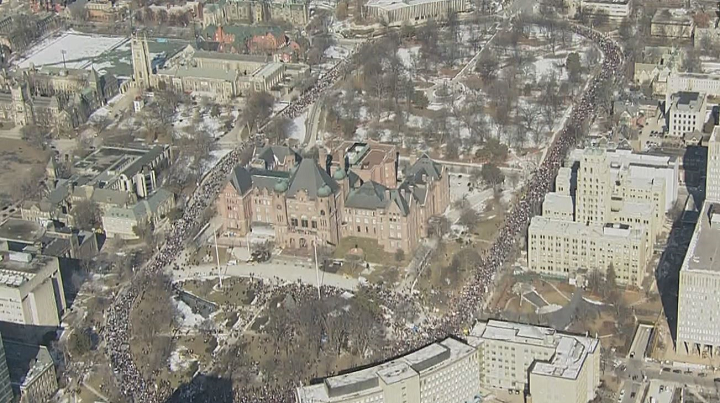All four Ontario teachers’ unions were engaged in some form of job action in protest of government changes to education funding in the province in the 2019/20 school year.

Work-to-rule, rotating strikes, and province-wide walkouts were courses of action taken by the unions, though all major unions have since reached deals with the government.
Global News compiled a list of key events and actions taken during the strikes.
End of August
Contracts for teachers and education workers at the province’s publicly-funded schools expire.
Nov. 1
The Elementary Teachers’ Federation of Ontario (ETFO) announces its members voted 98 per cent in favour of strike action.
Nov. 13
The Ontario English Catholic Teachers’ Association (OECTA) announces its members voted 97 per cent in favour of strike action.
Nov. 18
The Ontario Secondary School Teachers’ Federation (OSSTF) announces its members voted overwhelmingly in favour of strike action, with teachers giving a 95.5 per cent strike mandate.
Nov. 26
The first job action is taken when OSSTF begins engaging in work-to-rule action. Among the duties that OSSTF members no longer perform are the participation in EQAO preparation of testing, participation in unpaid staff meetings outside of the school day, and providing comments on secondary school report cards. The union says this marks their first province-wide job action in more than 20 years.
ETFO also begins work-to-rule job action, with members no longer performing administrative tasks.
Dec. 4
OSSTF holds a one-day province-wide walkout, closing public high schools and other schools with OSSTF members.

Dec. 11

Get daily National news
OSSTF holds its second one-day strike, this time only at select boards. It is the first of several rotating strikes which have continued weekly through January.
Dec. 12
Teachers’ unions announce a legal challenge against Bill 124, the Protecting a Sustainable Public Sector for Future Generations Act, which was passed by the government in November and capped public sector wage increases at one per cent for three years.

Dec. 20
The Association des enseignantes et des enseignants franco-ontariens (AEFO), which represents French-language teachers in the province, announces its members voted 97 per cent in favour of strike action.
Jan. 13
OECTA begins administrative job action, including no longer completing report cards, participating in EQAO-related activities, or attending initiatives by the Ministry of Education.

Jan. 16
AEFO begins a work-to-rule campaign for its members. The move means all four major teachers’ unions in Ontario are participating in some form of job action.
Jan. 20
ETFO takes part in the first of several daily rotating strikes during the week of Jan. 20. School boards in Toronto, York Region, and Ottawa are among the first affected.
Jan. 21
OECTA has a full withdrawal of services throughout the province leading to the closure of publicly-funded Catholic schools. Meanwhile, ETFO and OSSTF continue with rotating strikes.
Feb. 6
ETFO members hold a provincewide walkout, with a second one planned for Feb. 11.
Feb. 11
ETFO holds another provincewide walkout.
Feb. 12
All four of the province’s teacher unions announce a one-day, provincewide walkout for Feb. 21.

Feb. 13
AEFO holds its first provincewide walkout, meaning all four of the province’s teachers’ unions are now engaged in strike action.
Feb. 21
All four of the province’s largest teachers’ unions engage in a provincewide walkout — the largest in Ontario since 1997. In Toronto, thousands of educators surrounded Queen’s Park, leading to road closures.
March 12
OECTA announces it has reached a tentative deal with the province and would suspend strike action. Meanwhile, the Ontario government announces the closure of all publicly-funded schools in the province as a result of the novel coronavirus pandemic for two weeks following March break.
March 20
ETFO announces it has reached a tentative deal with the province and would suspend strike action.
March 31
AEFO announces it has reached a tentative deal with the province.
April 20
OSSTF announces it has reached a tentative deal with the province.

– With files from the Canadian Press









Comments
Want to discuss? Please read our Commenting Policy first.